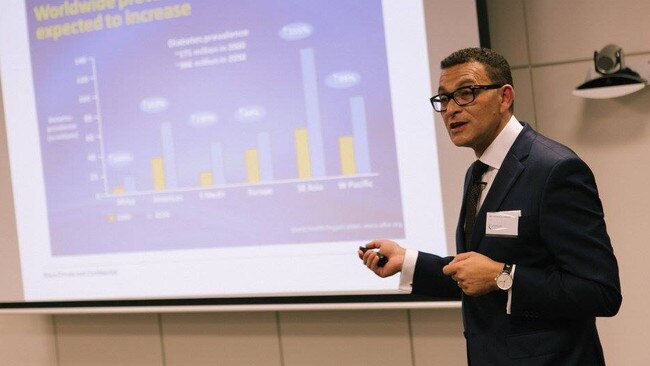Australians have embraced telehealth, says Bupa boss Hisham El-Ansary
The pandemic has changed the way Australians seek medical treatment, with telehealth and other digital medical consultations here to stay, says Bupa’s Asia Pacific boss.

Telehealth and other digital medical consultations is here to stay, Bupa’s outgoing Asia Pacific boss Hisham El-Ansary says, revealing how the pandemic has permanently changed the healthcare sector.
Mr El-Ansary was speaking as Bupa posted a 32 per cent surge in annual profit to $537m, while the Medical Board of Australia is seeking to clamp down on digital healthcare.
But Mr El-Ansary said the pandemic had shifted the mindset of Australians about how they want to receive medical treatment.
“We witnessed the acceleration of digital health during the pandemic. We know that telehealth is here to stay as it meets the needs of consumers, complementing in-person consultations and providing greater access to doctors and health professionals,” said Mr El-Ansary, who will leave Bupa at the end of this month.
“Our investments in new and innovative models of care including virtual and digital care, rehab in the home and chemo in the home are increasingly giving members a more personalised and connected health journey.”
The medical board is moving to contain a pandemic-fuelled explosion of telehealth care, which it says “should not be considered as a substitute for face-to-face consultations”.
Under the proposed new guidelines, which are based on recommendations drafted a decade ago, doctors are warned not to prescribe medication to first-time telehealth patients – a move which health funds and digital health players say will crimp a $2bn industry.
Telehealth has made medical care available in regional and remote areas, which have struggled to attract doctors and other health professions. But the burgeoning industry has also sparked controversy after some providers prescribed drugs from new medicinal cannabis products to treatments for erectile dysfunction based solely on phone calls or text-based questionnaires, without an in-person consultation.
The sector has begun reforming itself, with ASX-listed medicinal cannabis company Vitura Health – formerly known as Cronos – abolishing prescriptions based solely on a questionnaire.
Mr El-Ansary said demand remained strong for telehealth consults, even as the pandemic wanes, with Bupa investing in its own digital health services and at-home care models to capitalise on the trend.
In the past year, Bupa’s revenue eased 1 per cent to $10bn, with its aged care division dragging down its buoyant health insurance business.
In January – three years after the Aged Care Royal Commission – 22 nursing homes in Australia received a one-star rating out of five on the federal government’s new aged-care website. Of those, Bupa owned four – at Clemton Park and Waratah in NSW, Bairnsdale in Victoria and Woodville in Adelaide.
Average occupancy levels across all of Bupa’s aged care homes fell from 87 to 84 per cent, with the company citing higher costs relating to labour, and infection prevention and control.
“A sector-wide workforce shortage remains the key challenge, with an estimated 35,000 vacant roles across the aged sector. These workforce pressures have an impact on occupancy, particularly in regionally based homes,” Mr El-Ansary said.
“We have put in place several workforce initiatives to mitigate these pressures including carer traineeships, our registered nurses graduate program and our overseas nurses’ program, which has recently taken in its first group of nurses.”
Mr El-Ansary has previously argued that wealthier Australians should pay a greater share of the aged-care bill after selling their “multimillion-dollar homes” to give those who look after them a much-needed pay rise and fix a broken system.
This is despite the Fair Work Commission approving a 15 per cent pay rise late last year.
“As the government has recognised, addressing the significant workforce shortage today and making a career in aged care attractive for the next generation, requires a broad suite of reforms and Bupa welcomes the opportunity to contribute,” Mr El-Ansary said on Monday.
Across its health insurance division, policyholder growth jumped 4.2 per cent to 4.1 million members. It paid $5.7bn in benefits, with its $537m profit including $118m in claims expected to be deferred as a result of Covid-19.
The company will also postpone its 2023 premium increase by six months until October, saving members $79m. Other health insurers, including Medibank and NIB, have adopted similar deferrals.
Mr El-Ansary said it takes total pandemic-related “give backs” to almost $1bn.
“As we emerged from the most challenging health crisis of our time, we now face uncertain global and local economic conditions,” he said.
“Despite this, we’re growing as a business and are working hard to continue to deliver value for our customers and residents.”
Excluding its Covid-19 “give-back” and claims deferred from the pandemic, profit firmed 3 per cent.







To join the conversation, please log in. Don't have an account? Register
Join the conversation, you are commenting as Logout